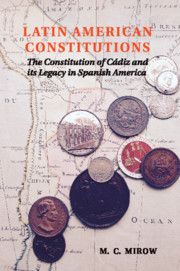Book contents
- Latin American Constitutions
- Latin American Constitutions
- Copyright page
- Dedication
- Contents
- Acknowledgments
- Introduction
- 1 Constitutional Limbo in Early Nineteenth-Century Latin America
- 2 The Constitution of Cádiz
- 3 The Colonies Speak to the Metropole
- 4 The Failures and Successes of Metropole Constitutionalism
- 5 Latin American Constitutionalism after Independence
- 6 The Legacy of the Constitution of Cádiz
- 7 Constitutional Promise
- Conclusion
- Appendix Selected Provisions of the Constitution of Cádiz of 1812*
- Bibliography
- Index
- References
Bibliography
Published online by Cambridge University Press: 05 October 2015
- Latin American Constitutions
- Latin American Constitutions
- Copyright page
- Dedication
- Contents
- Acknowledgments
- Introduction
- 1 Constitutional Limbo in Early Nineteenth-Century Latin America
- 2 The Constitution of Cádiz
- 3 The Colonies Speak to the Metropole
- 4 The Failures and Successes of Metropole Constitutionalism
- 5 Latin American Constitutionalism after Independence
- 6 The Legacy of the Constitution of Cádiz
- 7 Constitutional Promise
- Conclusion
- Appendix Selected Provisions of the Constitution of Cádiz of 1812*
- Bibliography
- Index
- References
Information
- Type
- Chapter
- Information
- Latin American ConstitutionsThe Constitution of Cádiz and its Legacy in Spanish America, pp. 283 - 306Publisher: Cambridge University PressPrint publication year: 2015
